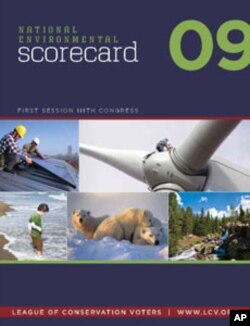An environmental group is applauding Congress for its green record in 2009 but sweeping climate change appears doubtful given the partisan divide on Capitol Hill.
Each year the Washington-based League of Conservation Voters releases a scorecard that rates the performance of members of Congress on environment and energy issues.
LCV Legislative director Tiernan Sittenfeld says this year's scorecard reflects an ambitious legislative agenda for the environment in both the House of Representatives and the Senate. The 2009 scorecard includes 11 Senate and 13 House votes dominated by clean energy and global warming.
Voting green
Among the environmentally-significant bills Congress passed last year was the American Recovery and Reinvestment Act, a nearly $800 billion economic stimulus package. Eighty billion dollars of that total was to be pumped into the U.S. economy to promote development of renewable energy, urban mass transit, high-speed rail systems and clean energy jobs.
Congress also boosted environmental funding and passed a public lands law. And last June, says Sittenfeld, the House passed the American Clean Energy and Security Act, the first bill out of either chamber of Congress to directly take on the challenge of global warming. University of Michigan political science professor Barry Rabe notes that the bill passed by a slim margin and that, in the months since that House vote, members have shifted positions.
Party lines
"It's not at all clear that if you took the same bill back to the House today that it would pass. Some of the supporters on the Republican side have expressed concerns," says Rabe. "A number of the Democrats, who voted for it, particularly from agricultural districts, about 38 legislators, have suggested that today might view that differently."
But before any bill can become law, the Senate must pass its version, the House and Senate bills must be reconciled and that final measure must be signed by the President.
Rabe says the League's 2009 Environmental Scorecard indicates that most of the votes on energy and the environment were split along party lines, reflecting the deep political divisions evident in other Congressional efforts. "If you see a number of scores on a hundred point scale on the 40, 50, 60 range that suggests that [members of Congress] are moving back and forth. You see an awful lot of folks on one side close to zero and on the other close to 100 percent."
Partisan divide
Rabe says as the November 2010 mid-term elections approach, prospects for any sweeping climate legislation are growing slimmer. "Instead we are more likely to see something that is …more connected with economic development and jobs creation."
Rabe adds that the 2009 Muhlenberg-Michigan National Survey of American Public Opinion on Climate Change released in January, finds voter concerns about the environment have declined, eclipsed in part by the economy, unemployment, banking and growing skepticism about government.
"This is often the case, when you go into a declining economy, that environmental concerns decline somewhat, in part because the impact of environmental problems, certainly climate change, are not likely to be felt immediately, and it's compelling to kick that proverbial can down the road and focus on whatever the issue of the moment is," says Rabe.
League of Conservation Voters president Gene Karpinski says opposition from the oil industry is another major roadblock to congressional passage of a comprehensive climate bill. "Big oil and their friends in Congress are trying to stop this," he says. "They are spending record amounts of money trying to stop this."
But Professor Rabe says partisanship poses an even greater roadblock. His view is that the debate has been one dominated by extreme on both sides. "So in that sense I am sympathetic with what might be stated by the LCV. The tricky part is presenting this in a way that is credible and allows for serious discussion."
One key to breaking the current impasse on climate and energy legislation, says the League's Gene Karpinski, will be if the public demands stronger leadership from members of Congress and from the White House. "And we need to make sure that public sends a message loudly and clearly that they want this done," he says.
Karpinski says to do that, the League of Conservation Voters has mounted a nation-wide campaign to build support for new climate legislation among labor, industry and veterans groups, who have been suspicious of the measure's potential impact on the American business community. The League hopes it can convince skeptics that a vote for a new climate law will be good not only for the U.S. economy but for the planet as well.










